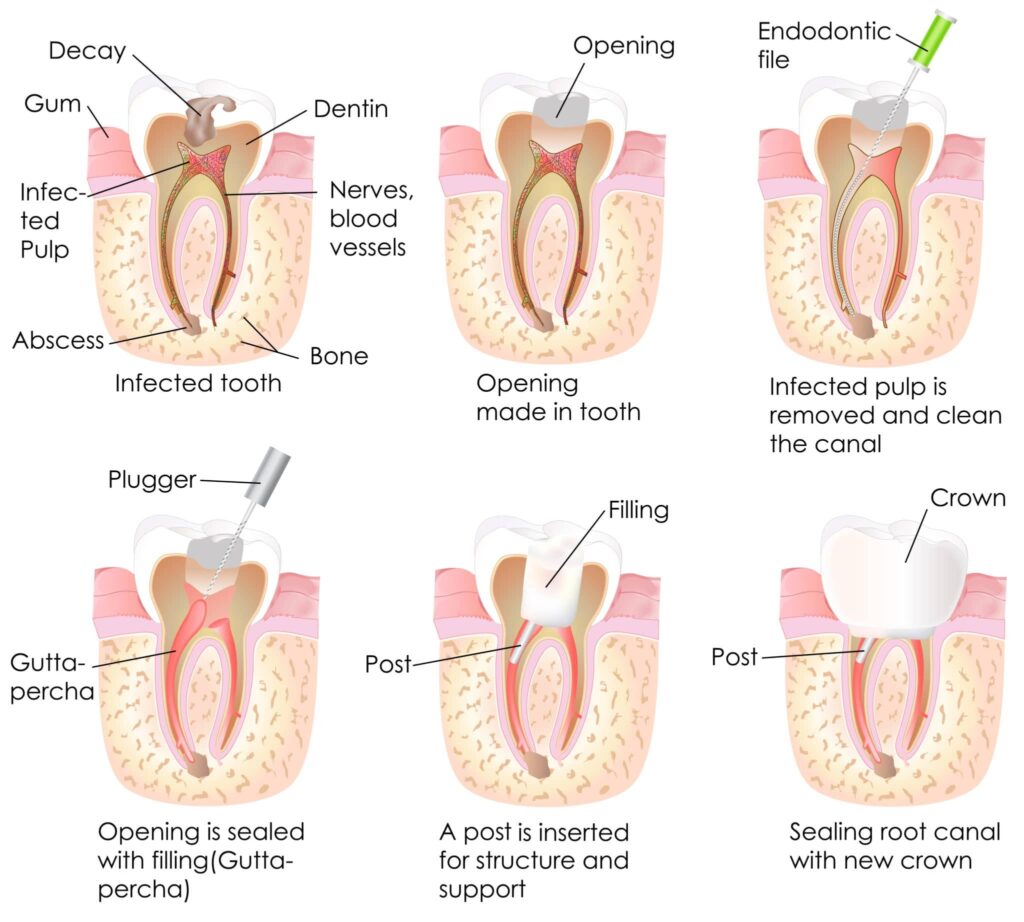What is a Root Canal?
A root canal is a dental procedure that is performed to treat an infected or severely decayed tooth. It involves removing the damaged or infected pulp, which is the soft tissue inside the tooth that contains nerves, blood vessels, and connective tissue. The pulp can become infected due to deep decay, repeated dental procedures on the same tooth, cracks or chips in the tooth, or trauma to the tooth.
During a root canal procedure, Dr. Tomar numbs the tooth and surrounding area with a local anesthetic. Then we create a small access hole in the tooth to reach the pulp chamber and root canals. The infected or damaged pulp is carefully removed using specialized instruments, and the canals are cleaned and shaped. Once the canals are cleaned, they are filled with a biocompatible material called gutta-percha, which seals the canals and prevents recontamination. In some cases, the tooth may be left open to drain and heal before the final sealing.
After a root canal is completed, a temporary filling or crown is placed on the tooth to protect it from further damage and to avoid complications while the tooth heals. Within a couple of weeks post procedure, a dental crown must be placed on the treated tooth to successfully complete the treatment.
A timely root canal can save a tooth from needing to be extracted, and eliminate the ongoing pain/infection associated with damaged pulp. Properly performed Root Canals are a successful and common dental treatment that allows you to retain your natural teeth and restore your oral health.
What precautions do I need to take before my procedure?
Before your root canal procedure, it’s important to follow certain precautions to ensure a smooth and successful treatment. Here are some basic precautions you need to take:
Consultation: Schedule a consultation with Dr. Tomar to discuss your case, understand the procedure, and address any concerns or questions you may have. We will examine your tooth, take X-rays, prescribe medication to treat any active infections, and then schedule the treatment accordingly.
Medication and Health History: Inform us about any medications you are currently taking, including over-the-counter drugs, supplements, or herbal remedies. Provide a detailed medical history, including any chronic conditions, allergies, or previous dental treatments.
Antibiotics: If you have a history of certain medical conditions, such as heart disease or a weakened immune system, we may also prescribe antibiotics before the procedure to prevent any potential infections.
Pain Management: If you are concerned about pain during the procedure, discuss pain management options with us.
Eating: Typically, there are no dietary restrictions before a root canal procedure. You should eat normally in advance of your procedure.
- Alcohol/Marijuana: Don’t consume alcohol and or marijuana at least 24 hrs in advance of your procedure.

After Procedure Care?
After a root canal procedure, it is generally safe to eat normally, but there are a few considerations to keep in mind to aid in the healing process. Here are some guidelines:
Numbness: The local anesthesia used during the procedure will temporarily numb your mouth and may affect your ability to chew and bite properly. It is advisable to wait until the numbness subsides (2-3 hrs) before attempting to eat anything to avoid accidentally biting your tongue, lips, or cheek.
Soft Foods: In the initial hours following the root canal, you may experience some discomfort or sensitivity around the treated tooth and surrounding area. It is recommended to stick to soft foods that require minimal chewing. Examples include mashed potatoes, soups, smoothies, yogurt, scrambled eggs, pasta, and cooked vegetables.
Avoid Hard or Sticky Foods: For a few days after the procedure, it is best to avoid hard or sticky foods that can put excessive pressure on the treated tooth or dislodge any temporary fillings or crowns. Avoid hard candies, nuts, chewing gum, tough meats, popcorn, or crunchy snacks.
Temperature Sensitivity: It is common to experience some sensitivity to hot or cold foods and beverages after a root canal procedure. You may want to avoid extreme temperatures and opt for lukewarm or room temperature foods and drinks until the sensitivity subsides.
Gentle Chewing: If you need to chew on the side of your mouth where the root canal was performed, do so gently and try to distribute the pressure evenly across your teeth. Chewing on the opposite side may be more comfortable initially.
Pain Management: Dr. Tomar will either recommend OTC pain medications and or prescribe specific medication to help you manage post procedure pain and or discomfort.
Oral Hygiene: Proper oral hygiene is essential after a root canal procedure. Follow the doctor’s instructions regarding brushing, flossing, and rinsing. It is crucial to keep the treated area clean to prevent any potential infections – specifically while it heals.
Follow-Up Care: Attend any follow-up appointments as scheduled. We will monitor your healing progress, remove any temporary fillings or crowns, and place a permanent dental crown.
Remember, these are general guidelines, we may provide specific instructions based on your unique situation. Call us at (253) 529-9434 if you experience any complications and or have additional questions about the procedure.



